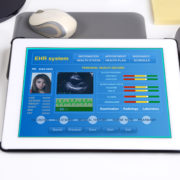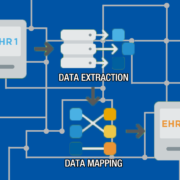How Do Electronic Health Records Improve Treatment Effectiveness and Efficiency?
One of the most revolutionizing changes that have taken place in the medical industry during the last decade is the switch to electronic health records (EHR). These digital versions of paper records have greatly impacted the care of patients as well as the ability to better manage patient information. In fact, 94 percent of medical providers state that their EHR systems make it much simpler to access vital records at the point of care. And 75 percent of these providers testify that their EHR systems have enabled them to provide better patient care. Let’s take a moment and look at the top five benefits of EHRs and how they are improving the quality of care physicians are able to provide to their patients.
1) Ability to Prevent Adverse Effects
Drug allergies, as well as negative drug interactions, are a major concern in the healthcare field. With web-based EHR systems, though, decision-making support tools enable providers to prevent adverse effects associated with these concerns. For example, providers can access a patient’s history and possible drug contraindications, allowing them to make better-informed decisions as to which medications to prescribe. Also of benefit is the fact that this information can be easily accessed by all physicians administering care to a specific patient; this means that regardless of where the patient is receiving care, the physician can access pertinent patient-specific information to provide the best care possible.
2) Easier Access to Large Volumes of Patient Data
Many patients have a large volume of medical care data. A complex history of medical attention and care can be quite difficult to access without the use of electronic health records. With digital records, though, physicians can clearly identify patient-specific needs by easily reviewing comprehensive files that outline all aspects of a patient’s health. These records typically provide information on the following:
- Family histories
- Financial circumstances/insurance information
- List of medications
- Environmental challenges
- Lifestyle risk factors
- Mental health status
- Past surgical events
3) Enhanced Management of Preventable Diseases
To improve the quality of care that patients can receive, EHR technology can alert physicians of patients who have yet to take advantage of today’s valuable screening exams. As physicians become better at directing patients to take advantage of these exams, it then becomes possible to help manage preventable diseases, such as colon cancer and glaucoma.
4) Better Research and Analytical Capabilities
One of the most valuable contributing factors to better patient care is quality research and analytical capabilities. With EHR systems, the ability to analyze patient data becomes much simpler. A variety of parameters can be used to generate outcomes, including the following:
- Population group
- Drug trial participation
- Active conditions
- Disease progression
As physicians and researchers have better access to this information, it allows them to make more informed decisions during each of their patient encounters. The information they access also becomes easier to share with peers and colleagues when using EHR systems.
5) Higher Levels of Patient Engagement and Compliance
Many EHR systems come with the benefit of having a patient portal; this greatly increases patient engagement by allowing them to become more involved in their healthcare. It gives them simple access to their data and information, which has shown to improve the follow up questions they have.
More so, if they notice any errors in their patient data, a patient portal allows them to notify their physicians of these errors and have them fixed promptly, thus improving the quality of care they receive. Studies have shown that patients who have access to their information are more likely to be in compliance with their healthcare regimens. These studies also show that the more involved a patient is in his care, the more likely he is to put forth extra effort toward reaching positive results.











